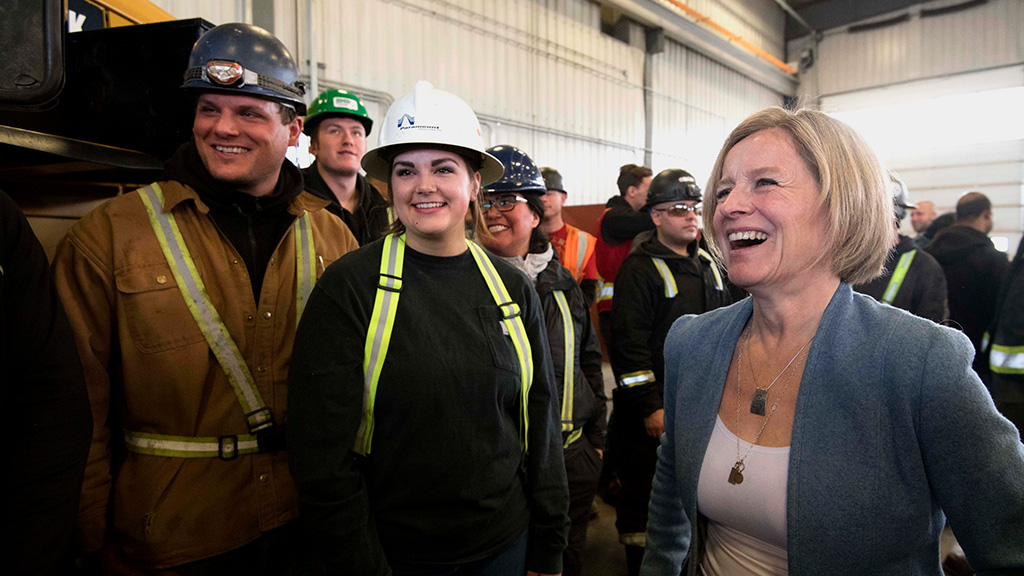The writ is dropped and the gloves are off.
Prominent members of the Alberta construction sector are pushing back on NDP Leader Rachel Notley’s support of “B.C.-style” community benefit agreements (CBAs) and her disapproval of double breasting as the May 29 general election approaches.
Paul de Jong, president of the Progressive Contractors Association of Canada, Mike Martens, president of the Independent Contractors and Businesses Association Alberta, and Ken Gibson, executive director of the Alberta Construction Association, all signed an open letter addressing their concerns to the NDP candidate and possible future premier on April 26.
“When Rachel Notley raised the prospect of implementing a B.C.-style CBA, it really caused a lot of alarm bells,” said de Jong.
“We felt it appropriate to kind of raise our voice together as the bulk of the construction industry. Our attempt was not to have a confrontation with the NDP ― they certainly have a right to propose policy pathways and they have an audience for that.”
De Jong said his colleagues weren’t advocating against CBAs entirely, but specifically against Notley calling for B.C.-style CBAs at a two different events in the past nine months. They are seeking clarity on what she intends.
“We recognize that community benefit agreements are a social procurement tool that can ― if properly consulted and well-constructed ― provide benefits. Typically, those benefits are to enhance business opportunities for local employers, to prioritize the hiring of women and Indigenous people and so on,” said de Jong.
“We don’t object to that at all.”
But the B.C. CBA has become a major source of discontent for open shop builders as it contains a stipulation requiring contractors who work on provincial infrastructure projects to be members of a B.C. building trade union.
In B.C., roughly 85 per cent of construction workers and contractors are open shop, meaning they don’t belong to a union. Therefore, the B.C. CBA is a “grossly coercive program aimed at giving select B.C. Building Trades Unions a monopoly over large parts of the province’s multibillion-dollar infrastructure projects,” reads the letter from de Jong, Martens and Gibson.
De Jong outlined how CBAs might be properly implemented in Alberta. He said one of the problems with CBAs is they change the traditional model of engagement between a contractor and owner and potentially bring to the table stakeholders who “really have nothing to do with the nexus of the construction contract.”
“Technically a union, even though they may bargain with the contractor, should not be a direct party to the commercial terms of a building project or a public building project,” he said. “A good CBA will have a clear scope around who the appropriate stakeholders are and what their role is to play.”
De Jong said consultation around how specific social objectives can be accomplished on projects should be extensive and malleable and possibly even “baked into the contract” for a project.
“The additional component to the CBA should be that it has a very tight awareness about what kind of costs might be represented in the execution of that agreement scheme ― if it’s going to increase the cost dramatically,” said de Jong.
“If a project is going to cost $10 million in addition to the normal price of the project to run the CBA, is that $10 million better spent elsewhere in the marketplace to benefit taxpayers? That’s a question that has to be, I think, addressed when a CBA is contemplated.”
The other concern raised by the three organizations is Notley signalling an intention, if elected, to do away with double breasting.
Double breasting is a term used in labour relations to refer to a corporation that has part of its corporate entity involved in a building trades union while other divisions of the company are not unionized or are involved in non-building trade unions such as the Christian Labour Association of Canada.
De Jong said double breasting is entirely decided by employees when they decide to be represented by a different union than one already representing employees of another company within a corporate group.
But he said this is simply a case of having different divisions of companies and corporations performing different types of work which then requires diverse representation and that double breasting is not a problem.
“If elected, she seems intent to change the corporate structures of companies so that they no longer have the ability to separate their businesses along the lines they see fit,” he said.
This could have a negative effect on attracting business and investment into the province.
“With double breasting, we’d like to see her completely back off on that type of language.
“Workers in Alberta are free under labour laws to choose to be represented in any manner that they want, and there’s no curtailing those rights.”
De Jong said neither he nor his constituents had heard back from Notley regarding their letter.
Notley did not respond to a request for an interview from the Journal of Commerce before publication.











Two major misconceptions the PCA has about the BC CBA’s is that only existing Union members are allowed on the job and that only Union contractors are allowed to bid. Both of those statements are incorrect. Any contractor who is able to perform the job is able to bid, regardless of their Union affiliation. If they are awarded the job, they must perform it under the terms and conditions of the collective agreement for that job only and can perform other projects simultaneously and after as a non-union entity. There are no restrictions to this under the BC CBA’s. With regards to non-union workers, the CBA’s allow the contractor to bring a certain amount (dependent on size of job, etc) of their own crew with them, regardless of whether they are in the Union or not, and the Unions must accept these workers as members. There is also a requirement for Unions to accept and dispatch any non-union worker who ranks higher than an available existing member on the hiring priority. For example, if there is a qualified worker that is not in the Union who lives closer to the job than any available existing Union members, the applicable Union would be required to accept that individual on the job. If anything, this model should be celebrated for its requirement for Unions to accept as new members, any qualified worker that meets the CBA objectives. I hope the PCA reads this so they understand and start encouraging their employers to bid these projects.
Double breasting is union busting as everyone knows. Stop lying.